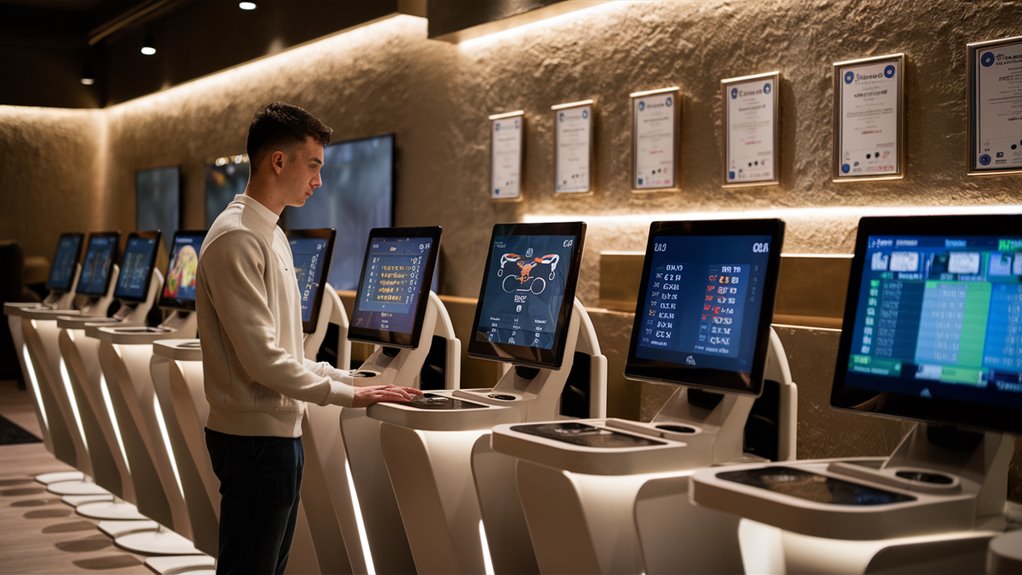Well, you know how betting used to be pretty straightforward – just sports and racing, right? These days, it’s a whole different ball game. The internet has blown the doors wide open, letting people bet on just about anything that crosses their mind. Want to predict the next plot twist in Succession? There’s probably a market for that. Curious about who’ll take home the trophy at the next League of Legends championship? You can put money on it.
But here’s the thing: this shift isn’t just about having more options to choose from. Think of it like Netflix replacing your old cable TV subscription. Just as streaming services learn what shows you like and suggest similar content, today’s betting platforms are getting more personal and tailored to what interests you. The betting world has moved from a one-size-fits-all approach to something that feels more like it was made just for you.
What’s really interesting is how social media and online communities have made betting more of a shared experience. People aren’t just placing bets anymore; they’re discussing odds in Discord channels, sharing tips on Reddit, and debating predictions on Twitter. It’s like having a global sports bar in your pocket, where everyone’s got an opinion and a stake in the game.
Traditional betting markets are getting pretty crowded, and that’s exactly why these quirky, specialized betting options are taking off. They’re filling gaps we didn’t even know existed, and honestly, they might just be showing us where the whole industry is headed. Pretty fascinating when you think about it, isn’t it?
The Rise of Digital Communities

Let’s talk about how digital communities have completely changed the way we connect and share betting insights. You know how it goes – one day you’re casually browsing social media, and before you know it, you’ve stumbled into an entire world of specialized betting enthusiasts sharing tips about everything from esports to who might win the next season of Survivor.
These online spaces have really transformed the whole betting landscape. Just hop onto a Discord server, browse through Reddit threads, or follow some Twitter conversations, and you’ll find yourself right in the middle of real-time discussions about market trends and betting strategies.
Gone are the days when you’d to rely solely on traditional betting circles or mainstream gambling sites.
What’s really fascinating is how each of these communities has developed its own unique personality. Ever notice the special lingo they use? Or those custom-built tools that pop up to help analyze betting patterns? It’s pretty amazing.
Whether you’re trying to predict cryptocurrency prices, figure out tomorrow’s weather odds, or bet on election outcomes, chances are there’s already a thriving community talking about it right now.
The best part? All this valuable information that used to be hard to track down is now just a few clicks away, making it super easy to learn from seasoned bettors and dig into historical data.
Think of these digital communities as your neighborhood coffee shop, where instead of chatting about local news, people are sharing insights about niche betting markets.
And just like any good conversation, everyone brings something unique to the table – from newbies asking questions to veterans sharing their time-tested strategies.
Untapped Market Opportunities

Let’s talk about something exciting that’s hiding in plain sight – untapped opportunities in today’s betting world. You know how everyone’s focused on mainstream sports betting? Well, there’s actually a whole universe of unexplored niches just waiting to be discovered.
Think about it. While most people are placing bets on football or basketball, there are fascinating new markets emerging every day. Take e-sports tournaments, for instance, or even reality TV show predictions.
These aren’t just random options, they’re genuine goldmines that hardly anyone’s paying attention to.
Here’s what makes this really interesting: you can spot these opportunities by looking where others aren’t. Want some examples? Picture virtual pet competitions, indie film award ceremonies, or even weather forecasting markets.
Pretty unique, right? These niches tend to attract super-passionate followers who really know their stuff, which makes for some really informed betting.
But here’s the thing about getting into these markets – you’ve got to do your homework. Let’s say you’re interested in weather betting. You’ll need to understand weather patterns, climate trends, and maybe even brush up on your meteorology.
Or if e-sports is more your thing, you’ll want to get familiar with gaming strategies and keep tabs on top players.
The best part? Big bookmakers often overlook these specialized markets, which means less competition and more room for creative approaches. It’s all about finding that sweet spot where passionate communities meet predictable outcomes.
When you hit that balance, you’ve got something special that can grow naturally over time.
Technology Driving Specialized Betting

Let’s talk about how technology is changing the world of specialized betting. You know how everything seems to be getting smarter these days? Well, betting markets are no exception.
AI has really stepped up its game, crunching massive amounts of data to figure out the odds for just about anything you can imagine betting on.
Remember when placing a bet meant going to a physical location? Now it’s as simple as pulling out your phone. Whether you’re into watching pro gamers duke it out in esports or following the latest virtual reality competitions, there’s probably an app for that.
The really cool thing about blockchain technology is how it’s made betting more trustworthy. Think of it like having a digital referee who can’t be fooled – every bet and outcome is right there for anyone to see.
Smart contracts have also changed the game by handling payouts automatically. No more waiting around wondering when you’ll get your winnings.
Live streaming has totally transformed how we experience these niche betting events. It’s pretty incredible when you think about it – you can watch a match happening on the other side of the world and place bets in real time, all from your couch.
The way these systems learn about what you like is pretty fascinating too. Machine learning keeps track of your interests and suggests new markets you might enjoy, kind of like how Netflix recommends shows based on what you’ve watched.
And with real-time data flowing through different platforms, you can make better-informed decisions about where to place your bets.
From predicting tomorrow’s weather to guessing election outcomes, specialized betting has never been more accessible. Technology has basically taken something that used to be complex and made it as simple as ordering takeout online.
Personalization Reshapes Betting Preferences

Let’s talk about how betting platforms have gotten really smart 먹튀검증 보증업체 추천 about knowing what you like. You know how Netflix suggests shows based on what you’ve watched?
Well, betting sites now do something similar. They look at your betting history, what sports catch your eye, and even how long you spend browsing different options to figure out what makes you tick.
Think about your typical betting routine. Maybe you’re really into e-sports or love following political odds. These platforms now pick up on these preferences and adjust your homepage to show exactly what interests you.
It’s pretty cool, actually – no more scrolling through endless markets you don’t care about. And get this: your preferences stick with you whether you’re on your phone, tablet, or computer.
The whole experience feels more like having a personal betting assistant. The system notices patterns in your behavior, like if you prefer certain odds ranges or specific types of bets.
It might notice you’re a night owl who loves betting on Asian football leagues, or perhaps you’re all about those weekend Premier League matches. Based on these habits, you’ll get notifications that actually matter to you.
What’s really interesting is how the platform learns from your reactions. Place a few bets on tennis matches, and suddenly you’re getting updates about upcoming tournaments.
Skip past horse racing consistently? The system takes the hint and shows you less of that. It’s this kind of smart adaptation that makes modern betting feel less like a one-size-fits-all service and more like your own personalized betting companion.
Millennial Betting Behavior Shifts

Ever noticed how betting looks totally different these days? Well, millennials are shaking things up in ways that would probably surprise old-school gamblers. Let’s break down what’s really happening in the world of betting.
Gone are the days when people would huddle around traditional casino tables or fill out paper betting slips. Today’s younger bettors are all about their smartphones and digital experiences.
Think about it – why wait in line at a betting shop when you can place a bet with just a few taps on your screen?
The really interesting part? Millennials aren’t just changing how they bet, but what they bet on. Traditional sports betting? Not so much.
Instead, they’re going wild for things like esports tournaments, fantasy leagues, and social gaming. It’s like they’ve taken the old betting rulebook and completely rewritten it.
You know what’s really caught on? Quick-fire betting during live events. Picture watching a football match and betting on the next corner kick or who scores the next goal – that’s the kind of instant action millennials love.
They want entertainment and excitement rolled into one package.
Speaking of new trends, cryptocurrency betting has really taken off with this crowd. It’s no surprise, really.
If you’re used to managing your life through apps and digital platforms, crypto betting feels like a natural fit. Plus, there’s this whole new world of betting on things you’d never expect – reality TV shows, viral TikTok trends, even election outcomes.
For traditional bookmakers, it’s been quite the wake-up call. They’ve had to get creative and tech-savvy pretty quickly.
These days, if you’re not offering mobile betting options with detailed stats and social features, you’re basically invisible to millennial bettors.
But here’s what makes all this truly fascinating: it’s not just about winning money anymore. This generation wants an experience – something they can share with friends, talk about on social media, and enjoy beyond just the thrill of winning or losing.
Micro-Betting and Real-Time Engagement

Let’s talk about how micro-betting has totally changed the way we watch sports these days. You know how we used to just sit back and wait for the final score?
Well, now it’s like being part of every single moment of the game. Picture this: you’re watching a baseball game, and instead of just betting on who’ll win, you can predict if the next pitch will be a strike or if that tennis serve will land in or out.
The really cool thing about micro-betting is how it fits right in your pocket. Most of us have smartphones now, and these betting apps have made it super simple to jump in on the action.
Just a quick tap here and there, and you’re making predictions on whether the next basketball possession will end in a three-pointer or if that soccer player is about to score from that corner kick.
Behind all this instant action, there’s some pretty clever tech at work. Think of it as a super-smart computer brain that’s constantly crunching numbers faster than we can blink.
It looks at everything from how well players have been performing lately to what’s happened in similar situations in past games. And you know what’s really interesting? This technology has made the whole thing much more trustworthy – no more wondering if the odds are fair or if your bet was processed correctly.
The best part? You don’t have to be a hardcore sports fan to get in on the fun. Maybe you’re just watching a game with friends, and suddenly you have a gut feeling about what’s going to happen next.
That’s all it takes to make things a bit more exciting. It’s like turning every single play into its own mini-game within the bigger picture.
Regulatory Changes and Market Access

Let’s break down how the sports betting landscape has changed in recent years. You know how things used to be pretty restricted? Well, that’s all shifting now, with many countries moving away from outright bans to embrace regulated betting markets.
Take the United States, for instance, where everything changed after that huge Supreme Court decision in 2018. Now each state gets to make its own rules, which honestly can get a bit confusing if you’re trying to keep track.
What’s really interesting is how these changes have opened up all sorts of new betting opportunities. Gone are the days when you could only bet on traditional sports like football or basketball.
Now you can put money on practically anything, from professional gamers battling it out in esports tournaments to election outcomes – though keep in mind that what’s allowed varies depending on where you live.
The digital revolution has made everything so much more accessible. Remember when placing a bet meant physically going somewhere? These days, it’s as simple as pulling out your phone and opening an app.
But here’s the thing – you still need to jump through some legal hoops. There’s identity verification to deal with, betting limits to consider, and you’ve got to make sure you’re actually allowed to bet from your location.
The good news? More markets are opening up all the time as governments start seeing the potential tax benefits. It’s pretty wild how quickly things are changing, and chances are we’ll see even more developments in the coming years.
Common Questions
What Is the Average Profit Margin for Niche Betting Operators?
Let’s talk about the profit margins in niche betting operations, because it’s actually quite interesting when you dig into the numbers. You know how most betting operators work – they’re looking to make a steady profit while keeping their customers happy.
Typically, these specialized betting companies see profit margins hovering between 5% and 12%, but there’s more to the story than just those numbers. Think of it like running a small specialty restaurant – your margins can really swing based on a bunch of different factors.
Several key things affect how much profit these operators actually pocket. Market conditions play a huge role, just like any business. When competition heats up, margins might get squeezed a bit lower. The size of the operator matters too – bigger companies can often work with thinner margins because they’re dealing with higher volumes.
What’s really fascinating is how different betting categories can affect these numbers. Some niche markets, like esports betting or specific sports leagues, might offer better margins because there’s less competition. Others might run on razor-thin profits just to stay competitive.
How Do Traditional Bookmakers View and Adapt to Niche Betting Markets?
You know, it’s fascinating to see how traditional bookmakers are gradually dipping their toes into niche betting markets these days. Think about it like a coffee shop that’s known for its classic espresso suddenly introducing artisanal brews – they need to be careful not to alienate their regular customers while attracting new ones.
These bookmakers aren’t just jumping in blindly, though. They’re taking a pretty smart approach, watching the market carefully and testing new betting options bit by bit. Let’s say someone wants to bet on esports or even the weather, well, bookmakers are starting to offer these options, but they’re doing it cautiously, kind of like a chef trying out new recipes during a soft launch.
What’s really interesting is how they’re handling the risks. Traditional bookmakers have gotten really good at calculating odds for mainstream sports over the years, but these niche markets? That’s a whole different ball game. They’re using sophisticated software, market analysis, and sometimes even bringing in experts who understand these specific areas to set their odds just right.
Some bookies are actually partnering with specialists who really know their stuff in particular niches. It’s similar to how a general contractor might bring in a specialist for custom work – they know when to rely on expert knowledge to get things right.
The bottom line? While these bookmakers are definitely expanding their horizons, they’re doing it in a way that protects their core business. After all, they’ve got a reputation to maintain and can’t afford to get it wrong.
Which Niche Betting Markets Have the Highest Customer Retention Rates?
You know what’s fascinating about betting markets? When it comes to keeping players coming back for more, esports and fantasy sports are absolutely crushing it. Let’s break this down a bit. Think about it – these markets naturally hook players because there’s always something happening. Whether it’s League of Legends tournaments running year-round or fantasy football leagues that keep friends trash-talking for months, they create this perfect storm of entertainment and competition.
Virtual sports have carved out their own loyal following too, but here’s the interesting part: political betting has emerged as quite the dark horse in customer retention. Maybe it’s because both these niches tap into something deeper than just placing bets. With virtual sports, you can jump in anytime, day or night, while political betting gets people incredibly invested in real-world outcomes.
What makes these markets so sticky? Well, it’s the social aspect that really seals the deal. Just imagine the group chats exploding during a major esports tournament, or friends debating their fantasy league picks over dinner. These aren’t just betting markets, they’re community builders, and that’s why players stick around for the long haul.
What Security Measures Protect Bettors in Specialized Betting Markets?
Let’s talk about staying safe when you’re diving into specialized betting markets. You know how important security is when it comes to your money, right? Well, the good news is that there are quite a few protective measures in place to keep you and your funds secure.
First up, you’ve got secure payment gateways watching your back. Think of them as bouncers at an exclusive club, carefully checking everyone who comes through the door. These gateways make sure your financial information stays private and protected every time you place a bet.
Before you can even start betting, you’ll need to prove you’re really you. It’s kind of like showing your ID at the bank, but online. This identity verification helps keep the bad actors out and ensures only legitimate bettors are participating.
When it comes to your actual transactions, everything’s encrypted. Picture your betting data traveling through a super-secure digital tunnel that nobody else can peek into. Pretty neat, right?
But wait, there’s more. Licensed operators are constantly monitoring everything that happens on their platforms. They’re like watchful lifeguards at a pool, making sure everyone follows the rules and stays safe.
And if something does go wrong? No worries. There are dispute resolution systems in place to help sort things out. It’s like having a referee who can step in and make fair calls when needed.
Just remember to do your homework before jumping in. Take a quick look at the regulatory compliance of any betting platform you’re considering. After all, you wouldn’t hand your wallet to a stranger, so why trust your money to an unlicensed betting site?
Are Niche Betting Markets More Vulnerable to Match-Fixing and Fraud?
You know what’s interesting about betting markets? The smaller, less-known ones can be pretty tricky territory. Think about it like this: while everyone’s watching the Super Bowl or World Cup matches, those niche sports competitions often fly under the radar. This makes them more vulnerable to people trying to game the system.
Let’s break it down. When you’re dealing with smaller betting markets, there’s naturally less money flowing through them. This means any suspicious betting patterns are harder to spot, kind of like trying to find a ripple in a smaller pond versus an ocean. The bookmakers and regulators simply can’t keep as close an eye on these markets as they do on major sporting events.
The thing is, fraudsters and match-fixers know this all too well. They often target these lesser-known competitions, like lower-division soccer matches or obscure tennis tournaments, because there’s less scrutiny. With fewer people watching and betting, it becomes easier to manipulate outcomes without raising immediate red flags.
Plus, the players in these smaller competitions typically earn less money, which unfortunately makes them more susceptible to bribes. It’s a bit like leaving your back door unlocked while installing an expensive security system at the front – the weak spots are pretty obvious to anyone looking to exploit them.



